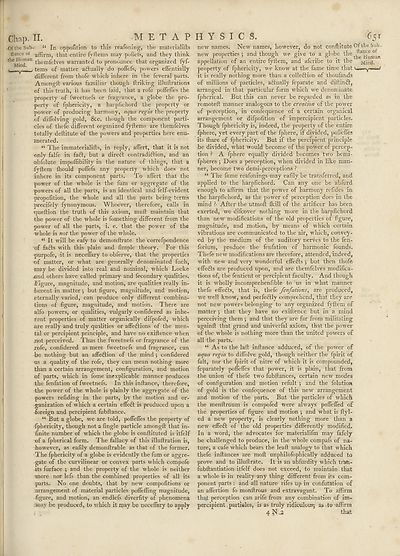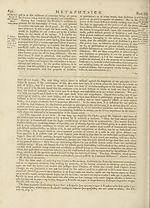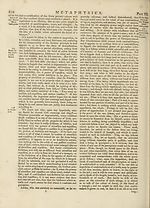Encyclopaedia Britannica, or, a Dictionary of arts, sciences, and miscellaneous literature : enlarged and improved. Illustrated with nearly six hundred engravings > Volume 13, MAT-MIC
(697) Page 651
Download files
Complete book:
Individual page:
Thumbnail gallery: Grid view | List view

Chap. II. .META P
•Of the Sub- {{ In oppoiition to tills reafoning, the materialifts
ftance ot affirm, that entire fyftems may pofieis, and they think
t^eiV]ind,an themfelve5 warranted to pronounce that organized fyf-
i . terns of matter a6tuaJiy do poflels, powers effentially
different from thofe which inhere in the feveral parts.
Amongft various familiar though ftriking illuflrations
of this truth, it has been laid, that a rofe poffeffes the
property of fweetnefs or fragrance, a globe the pro¬
perty of fphericity, a harpfichord the jiroperty or
power of producing harmony, aqua regia the property
of diffolving gold, &c. though the component parti¬
cles of thefe different organized fyflems are themfelves
totally deftitute of the powers and properties here enu¬
merated.
“ The immaterialifls, in reply, affert, that it is not
only falfe in faff, but a direft contradi6Kon, and an
abfolute impoffibility in the nature of things, that a
fyftem ffiould poffefs any property which does not
inhere in its component parts. To affert that the
power of the whole is the fum or aggregate of the
powers of all the parts, is an identical and felf-evident
propofition, the whole and all the parts being terms
•precifely fynonymous. Whoever, therefore, calls in
queflion the truth of this axiom, mult maintain that
the power of the whole is fomething different from the
power of all the parts, i. e. that the power of the
whole is not the power of the whole.
“ It will be eafy to demonftrate the correfpondence
of fadts with this plain and fimple theory. For this
purpofe, it is neceffary to obferve, that the properties
*of matter, or what are generally dertominated fuch,
may be divided into real and nominal, which Locke
end others have called primary and fecondary qualities.
Figure, magnitude, and motion, are qualities really in¬
herent in matter j but figure, magnitude, and motion,
eternally varied, can produce only different combina¬
tions of figure, magnitude, and motion. There are
alfo powrers, or qualities, vulgarly confidered as inhe¬
rent properties of matter organically difpofed, wffiich
are really and truly qualities or affections of the men¬
tal or percipient principle, and have no exiftence when
not perceived. Thus the fweetnefs or fragrance of the
rofe, confidered as mere fweetnefs and fragrance, can
-be nothing but an affedtion of the mind j confidered
as a quality of the rofe, they can mean nothing more
than a certain arrangement, configuration, and motion
of parts, which in fome inexplicable manner produces
the fenfation of fweetnefs. In this inffance, therefore,
the power of the whole is plainly the aggregate of the
powers refiding in the parts, by the motion and or¬
ganization of which a certain effedt is produced upon a
foreign and percipient fubltance.
“ But a globe, v7e are told, poffeffes the property of
fphericity, though not a fingle particle amongft that in¬
finite number of which the globe is conftituted is itfelf
of a fpherical form. The fallacy of this illuftration is,
however, as eafily demonftrable as that of the former.
The fphericity of a globe is evidently the fum or aggre¬
gate of the curvilinear or convex parts which compofe
its furface •, and the property of the wdiole is neither
more nor lefs than the combined properties of all its
parts. No one doubts, that by new compofitions or
arrangement of material particles poffeffing magnitude,
figure, and motion, an endlefs diverfity of phenomena
may be produced, to which it may be necelfary to apply
H Y s i c s. 6
new names. Newr names, however, do not conflitute Of the J
new properties j and though we give to a globe the tj^ea!j^nvin
appellation of an entire fyftem, and aferibe to it the Mind,
property of fphericity, we know at the fame time that'.. ..i*
it is really nothing more than a colledtion of thoufands
of millions of particles, adtually feparate and diltindt,
arranged in that particular form wffiich we denominate
fpherical. But this can never be regarded as in the
remoteft manner analogous to the creation of the power
of perception, in conlequence of a certain organical
arrangement or difpofition of impercipient particles.
Though fphericity is, indeed, the property of the entire
fphere, yet every part of the fphere, if divided, pofieffes
its ffiare of fphericity. But if the percipient principle
be divided, wffiat would become of the power ol percep¬
tion r A fphere equally divided becomes two hemi-
fpheres \ Does a perception, when divided in like man¬
ner, become two demi-perceptions ?
“ The fame reafonings-may eafily be transferred, and
applied to the harpfichord. Can any one be abfurd
enough to affirm that the power of harmony refides in
the harpfichord, as the power of perception does in the
mind ?■ After the utmoft Ikill of the artificer has been
exerted, we difeover nothing more in the harpfichord
than new modifications of the old properties of figure,
magnitude, and motion, by means of which certain
vibrations are communicated to the air, which, convey¬
ed by the medium of the auditory nerves to the fen-
forium, produce the fenfation of harmonic founds.
Thefe new modifications are therefore, attended, indeed,
with new and very wonderful effects ; but then tliofe
elfefts are produced upon, and are themfelves modifica¬
tions of, the fentient or percipient faculty. And though
it is wholly incomprehenfible to us in what manner
thefe effefts, that is, tliefe fenfations, are produced,
we wrell know, and perfe<511y comprehend, that they are
not new powers belonging to any organized fyftem of
matter \ that they have no exiftence but in a mind
perceiving them; and that they are far from militating
againft that grand and univerfal axiom, that the power
of the whole is nothing more than the united powers of
all the parts.
“ As to the laft inftance adduced, of the power of
aqua regia to diffolve gold, though neither the fpirit of
fait, nor the fpirit of nitre of which it is compounded,
feparately poffeffes that power, it is plain, that from
the union of thefe two fubftances, certain new modes
of configuration and motion refult ; and the folutioa
of gold is the confequence of this new arrangement
and motion of the parts. But the particles of which
the menftruum is compofed were always poffeffed of
the properties of figure and motion *, and what is ftyl-
ed a new property, is clearly nothing more than a
new effeft of the old properties differently modified.
In a word, the advocates for materialifm may fafely
be challenged to produce, in the whole compafs of na¬
ture, a cafe which bears the leaft analogy to that which
thefe inftances are moft unphilofophically adduced to
prove and to illuftrate. It is an abfurdity which tr&ir-
fubftantiation itfelf does not exceed, to maintain that
a whole is in reality any thing different from its com¬
ponent parts : and all nature rifes up in confutation of
an affertion fo monftrous and extravagant. To affirm
that perception can arife from any combination of im¬
percipient particles, is as truly ridiculous-, as to affirm
4N.2 that
Oi
•Of the Sub- {{ In oppoiition to tills reafoning, the materialifts
ftance ot affirm, that entire fyftems may pofieis, and they think
t^eiV]ind,an themfelve5 warranted to pronounce that organized fyf-
i . terns of matter a6tuaJiy do poflels, powers effentially
different from thofe which inhere in the feveral parts.
Amongft various familiar though ftriking illuflrations
of this truth, it has been laid, that a rofe poffeffes the
property of fweetnefs or fragrance, a globe the pro¬
perty of fphericity, a harpfichord the jiroperty or
power of producing harmony, aqua regia the property
of diffolving gold, &c. though the component parti¬
cles of thefe different organized fyflems are themfelves
totally deftitute of the powers and properties here enu¬
merated.
“ The immaterialifls, in reply, affert, that it is not
only falfe in faff, but a direft contradi6Kon, and an
abfolute impoffibility in the nature of things, that a
fyftem ffiould poffefs any property which does not
inhere in its component parts. To affert that the
power of the whole is the fum or aggregate of the
powers of all the parts, is an identical and felf-evident
propofition, the whole and all the parts being terms
•precifely fynonymous. Whoever, therefore, calls in
queflion the truth of this axiom, mult maintain that
the power of the whole is fomething different from the
power of all the parts, i. e. that the power of the
whole is not the power of the whole.
“ It will be eafy to demonftrate the correfpondence
of fadts with this plain and fimple theory. For this
purpofe, it is neceffary to obferve, that the properties
*of matter, or what are generally dertominated fuch,
may be divided into real and nominal, which Locke
end others have called primary and fecondary qualities.
Figure, magnitude, and motion, are qualities really in¬
herent in matter j but figure, magnitude, and motion,
eternally varied, can produce only different combina¬
tions of figure, magnitude, and motion. There are
alfo powrers, or qualities, vulgarly confidered as inhe¬
rent properties of matter organically difpofed, wffiich
are really and truly qualities or affections of the men¬
tal or percipient principle, and have no exiftence when
not perceived. Thus the fweetnefs or fragrance of the
rofe, confidered as mere fweetnefs and fragrance, can
-be nothing but an affedtion of the mind j confidered
as a quality of the rofe, they can mean nothing more
than a certain arrangement, configuration, and motion
of parts, which in fome inexplicable manner produces
the fenfation of fweetnefs. In this inffance, therefore,
the power of the whole is plainly the aggregate of the
powers refiding in the parts, by the motion and or¬
ganization of which a certain effedt is produced upon a
foreign and percipient fubltance.
“ But a globe, v7e are told, poffeffes the property of
fphericity, though not a fingle particle amongft that in¬
finite number of which the globe is conftituted is itfelf
of a fpherical form. The fallacy of this illuftration is,
however, as eafily demonftrable as that of the former.
The fphericity of a globe is evidently the fum or aggre¬
gate of the curvilinear or convex parts which compofe
its furface •, and the property of the wdiole is neither
more nor lefs than the combined properties of all its
parts. No one doubts, that by new compofitions or
arrangement of material particles poffeffing magnitude,
figure, and motion, an endlefs diverfity of phenomena
may be produced, to which it may be necelfary to apply
H Y s i c s. 6
new names. Newr names, however, do not conflitute Of the J
new properties j and though we give to a globe the tj^ea!j^nvin
appellation of an entire fyftem, and aferibe to it the Mind,
property of fphericity, we know at the fame time that'.. ..i*
it is really nothing more than a colledtion of thoufands
of millions of particles, adtually feparate and diltindt,
arranged in that particular form wffiich we denominate
fpherical. But this can never be regarded as in the
remoteft manner analogous to the creation of the power
of perception, in conlequence of a certain organical
arrangement or difpofition of impercipient particles.
Though fphericity is, indeed, the property of the entire
fphere, yet every part of the fphere, if divided, pofieffes
its ffiare of fphericity. But if the percipient principle
be divided, wffiat would become of the power ol percep¬
tion r A fphere equally divided becomes two hemi-
fpheres \ Does a perception, when divided in like man¬
ner, become two demi-perceptions ?
“ The fame reafonings-may eafily be transferred, and
applied to the harpfichord. Can any one be abfurd
enough to affirm that the power of harmony refides in
the harpfichord, as the power of perception does in the
mind ?■ After the utmoft Ikill of the artificer has been
exerted, we difeover nothing more in the harpfichord
than new modifications of the old properties of figure,
magnitude, and motion, by means of which certain
vibrations are communicated to the air, which, convey¬
ed by the medium of the auditory nerves to the fen-
forium, produce the fenfation of harmonic founds.
Thefe new modifications are therefore, attended, indeed,
with new and very wonderful effects ; but then tliofe
elfefts are produced upon, and are themfelves modifica¬
tions of, the fentient or percipient faculty. And though
it is wholly incomprehenfible to us in what manner
thefe effefts, that is, tliefe fenfations, are produced,
we wrell know, and perfe<511y comprehend, that they are
not new powers belonging to any organized fyftem of
matter \ that they have no exiftence but in a mind
perceiving them; and that they are far from militating
againft that grand and univerfal axiom, that the power
of the whole is nothing more than the united powers of
all the parts.
“ As to the laft inftance adduced, of the power of
aqua regia to diffolve gold, though neither the fpirit of
fait, nor the fpirit of nitre of which it is compounded,
feparately poffeffes that power, it is plain, that from
the union of thefe two fubftances, certain new modes
of configuration and motion refult ; and the folutioa
of gold is the confequence of this new arrangement
and motion of the parts. But the particles of which
the menftruum is compofed were always poffeffed of
the properties of figure and motion *, and what is ftyl-
ed a new property, is clearly nothing more than a
new effeft of the old properties differently modified.
In a word, the advocates for materialifm may fafely
be challenged to produce, in the whole compafs of na¬
ture, a cafe which bears the leaft analogy to that which
thefe inftances are moft unphilofophically adduced to
prove and to illuftrate. It is an abfurdity which tr&ir-
fubftantiation itfelf does not exceed, to maintain that
a whole is in reality any thing different from its com¬
ponent parts : and all nature rifes up in confutation of
an affertion fo monftrous and extravagant. To affirm
that perception can arife from any combination of im¬
percipient particles, is as truly ridiculous-, as to affirm
4N.2 that
Oi
Set display mode to:
![]() Universal Viewer |
Universal Viewer | ![]() Mirador |
Large image | Transcription
Mirador |
Large image | Transcription
Images and transcriptions on this page, including medium image downloads, may be used under the Creative Commons Attribution 4.0 International Licence unless otherwise stated. ![]()
| Permanent URL | https://digital.nls.uk/192693108 |
|---|
| Attribution and copyright: |
|
|---|
| Description | Ten editions of 'Encyclopaedia Britannica', issued from 1768-1903, in 231 volumes. Originally issued in 100 weekly parts (3 volumes) between 1768 and 1771 by publishers: Colin Macfarquhar and Andrew Bell (Edinburgh); editor: William Smellie: engraver: Andrew Bell. Expanded editions in the 19th century featured more volumes and contributions from leading experts in their fields. Managed and published in Edinburgh up to the 9th edition (25 volumes, from 1875-1889); the 10th edition (1902-1903) re-issued the 9th edition, with 11 supplementary volumes. |
|---|---|
| Additional NLS resources: |
|

